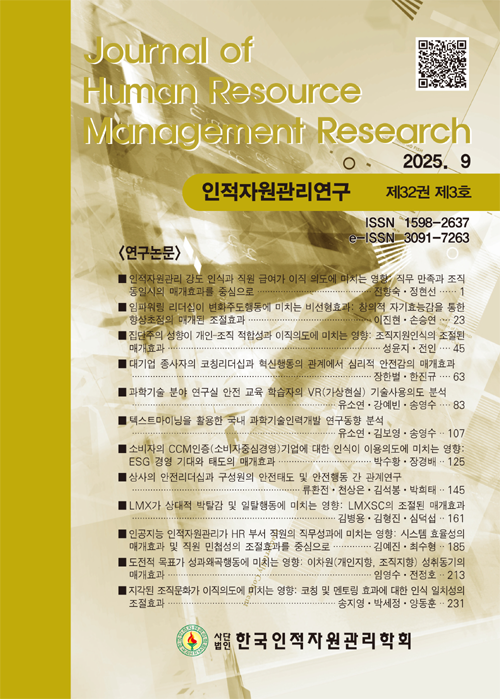- 영문명
- A Study on the Analysis of Learners’ Behavioral Intention to Use Virtual Reality in Laboratory Safety Education in the Science and Technology Field
- 발행기관
- 한국인적자원관리학회
- 저자명
- 유소연(Soyeon Yu) 강예빈(Yebin Kang) 송영수(Youngsoo Song)
- 간행물 정보
- 『인적자원관리연구』제32권 제3호, 83~106쪽, 전체 24쪽
- 주제분류
- 경제경영 > 경영학
- 파일형태
- 발행일자
- 2025.09.30
5,680원
구매일시로부터 72시간 이내에 다운로드 가능합니다.
이 학술논문 정보는 (주)교보문고와 각 발행기관 사이에 저작물 이용 계약이 체결된 것으로, 교보문고를 통해 제공되고 있습니다.

국문 초록
과학기술 분야의 고위험 환경에서 안전교육의 필요성 및 중요성이 지속적으로 강조되고 있다. 이에 따라 학습전이를 위한 학습자 중심 교육 콘텐츠 제공을 목적으로 VR을 적용한 교육 프로그램에 대한 논의가 교육현장을 중심으로 활발히 이루어지고 있다. 특히, VR 교육의 효과성을 제고하기 위해서는 학습자의 실제 기술 활용 여부를 예측할 수 있는 VR 기술수용의도에 대한 이해가 중요하며, 이를 기반으로 한 관련 연구가 다수 진행되고 있다. 본 연구는 이와 같은 흐름에 입각하여 연구실 안전교육에서 VR 기술의 수용 의도와 실제 사용행동에 영향을 미치는 요인을 실증적으로 분석하고자 하였다.
이를 위해 A기관에서 연구실 안전사고 예방교육을 이수한 379명을 대상으로 온라인 설문조사를 실시하고, 탐색적 요인분석, 확인적 요인분석, 구조방정식 모형 분석을 통해 가설을 검증하였다. 통합기술수용모형(UTAUT)을 토대로 성과기대, 노력기대, 사회적 영향, 촉진조건이 VR 기술의 사용 의도와 실제 사용 행동에 미치는 영향을 분석하고, 사용 의도의 매개 효과도 함께 검토하였다. 연구 결과, 성과기대와 노력기대는 VR 기술 사용 의도에 통계적으로 유의한 영향을 미쳤으며, 사용 의도는 실제 사용 행동에도 유의미한 영향을 주는 것으로 나타났다. 반면 사회적 영향과 촉진조건은 VR 기술 사용 의도와 행동에 대해 유의한 영향력을 보이지 않았다. 더불어 성과기대와 노력기대는 사용 의도를 매개로 하여 사용 행동에 간접적인 유의미한 영향을 미치는 것으로 확인되었다.
이 연구결과는 연구실 안전교육과 같은 실천 중심의 교육에서는 동료나 조직의 기대와 같은 외재적 영향보다 학습자의 내적 동기와 기술 활용에 대한 자기 인식이 보다 중요한 영향요인으로 작용함을 보여준다. 이에 따라 VR 기반 교육의 효과를 극대화하기 위해 학습자의 기술 인식과 수용 특성을 반영한 맞춤형 설계가 필요하며, 향후 몰입형 안전교육 콘텐츠의 개발과 운영에 기초자료로 활용될 수 있을 것이다.
영문 초록
The importance of safety education in high-risk environments within the science and technology sector has been increasingly emphasized. In response, the application of virtual reality (VR) in education is gaining attention as a means to develop learner-centered content that promotes experiential learning and facilitates transfer to real-world practice. This study follows this trend and aims to empirically analyze the factors influencing learners’ intention to use and actual usage behavior of VR technology in the context of laboratory safety education.
A survey was administered to the entire population of individuals who had completed a laboratory safety accident prevention program offered by a public education institution. Among them, 379 participants responded to the online questionnaire. Based on the collected responses, exploratory factor analysis, confirmatory factor analysis, and structural model analysis were conducted. Using the Unified Theory of Acceptance and Use of Technology (UTAUT) as a framework, this study examined how performance expectancy, effort expectancy, social influence, and facilitating conditions affect behavioral intention and actual use of VR technology. The results showed that performance expectancy and effort expectancy had significant effects on behavioral intention, which in turn significantly influenced actual usage behavior. Conversely, social influence and facilitating conditions did not show significant effects. Additionally, performance expectancy and effort expectancy demonstrated significant indirect effects on usage behavior through behavioral intention.
These findings suggest that in practical, action-oriented education such as laboratory safety training, learners’ internal motivation and self-perception of technology use play a more critical role than external influences. This study offers practical implications for the design of VR-based immersive education by emphasizing the need to consider learners’ perceptions and acceptance of technology. The results serve as empirical evidence to support the development and implementation of immersive safety training programs in future educational contexts.
목차
Ⅰ. 서 론
Ⅱ. 이론적 배경
Ⅲ. 연구방법
Ⅳ. 연구결과
Ⅴ. 결론 및 논의
참고문헌
키워드
해당간행물 수록 논문
- 인적자원관리연구 제32권 제3호 목차
- HRM beats big bucks? The Influence of perceived HRM system strength and pay level on job satisfaction, organizational identification, and turnover intention
- 임파워링 리더십이 변화주도행동에 미치는 비선형효과 - 창의적 자기효능감을 통한 향상초점의 매개된 조절효과
- 집단주의 성향이 개인-조직 적합성과 이직의도에 미치는 영향 - 조직지원인식의 조절된 매개효과
- 대기업 종사자의 코칭리더십과 혁신행동의 관계에서 심리적 안전감의 매개효과
- 과학기술 분야 연구실 안전 교육 학습자의 VR(가상현실) 기술사용의도 분석
- 텍스트마이닝을 활용한 국내 과학기술인력개발 연구동향 분석
- 소비자의 CCM인증(소비자중심경영)기업에 대한 인식이 이용의도에 미치는 영향 - ESG 경영 기대와 태도의 매개효과
- 상사의 안전리더십과 구성원의 안전태도 및 안전행동 간 관계연구
- LMX가 상대적 박탈감 및 일탈행동에 미치는 영향: LMXSC의 조절된 매개효과
- 인공지능 인적자원관리가 HR 부서 직원의 직무성과에 미치는 영향 - 시스템 효율성의 매개효과 및 직원 민첩성의 조절효과를 중심으로
- 도전적 목표가 성과왜곡행동에 미치는 영향 - 이차원(개인지향, 조직지향) 성취동기의 매개효과
- 지각된 조직문화가 이직의도에 미치는 영향 - 코칭 및 멘토링 효과에 대한 인식 일치성의 조절효과
참고문헌
교보eBook 첫 방문을 환영 합니다!

신규가입 혜택 지급이 완료 되었습니다.
바로 사용 가능한 교보e캐시 1,000원 (유효기간 7일)
지금 바로 교보eBook의 다양한 콘텐츠를 이용해 보세요!



